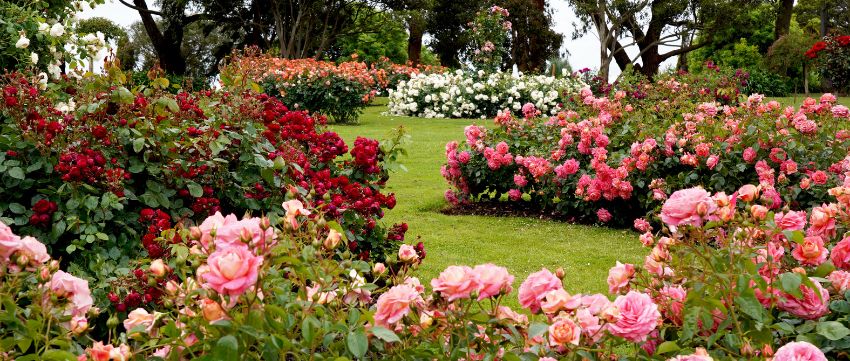
Gardens burst with life, color and aroma during the summers. However, extreme heat and weather conditions can easily render your lush green landscape into a wilting and drying mess. Proper upkeep and tendering are essential to keep your garden blooming. Don’t make a mess out of your beautiful garden owing to the summer heat! Embrace these expert tips that help you keep your garden and outdoor space thriving throughout the year. These tips can help you nurture a vegetable patch, maintain for a flower bed or even maintain a lush lawn.
Remember a golden rule of gardening in summer – mornings are your ultimate friend. Make the maximum out of these cool hours of the day during summer to maintain of your plants, allowing them to bloom.
Mornings come with cool air and reduced intensity of the sun, forming the perfect conditions for both you and your plants. Water your plants during this time of the day to ensure maximum absorption, as later, the heat rises and the water evaporates faster. Additionally, prevent fungal infections on the leaves of your plants from being wet overnight.
Avoid shallow watering and focus on deep, infrequent watering to develop strong root systems. Drip irrigation systems or soaker hoses help deliver water directly to the roots eliminating chances of evaporation. Rainwater harvesting can further help by reducing water waste and lowering gardening costs.
Heat-tolerant plants are your go-to options during the summer as they thrive even in extreme heat conditions. Tolerance towards heat is essential during summer, as it is no time to plant delicate divas in your garden. Cautiously curate your plant selection, stressing native plants that are adaptive to the weather conditions.
Deadheading and pruning ensure fresh blooms during summers to maintain a vibrant garden throughout. Pruning allows the removal of dead or damaged leaves, making way for better air circulation and eliminating pests and diseases. Make sure to prune away unwanted shrubs and hedges that can cast shadows on sun-loving plants.
Plants get depleted of nutrients rapidly due to summer heat, leaving them hungry. Slow-release fertilizers that are tailored to the needs of your garden for a steady nutrient supply for an instant boost. If you are into organic farming, consider using manure or compost that enriches soil naturally. Monitor plants to check signs of nutrient deficiency like yellowing leaves or stunted growth that help in taking prompt actions.
Some plants need protection from the summer sun, while some revel in it. Protect vulnerable plants from the summer sun using temporary shades, using tools and mechanisms like garden umbrellas, shade cloths, or even strategically placed pots. You can also move plants in containers to shaded places during afternoon heat. Bolting of tender crops like lettuce or spinach can be prevented using proper shading.
Pests, ready to feast on your hard work, flock in your garden during the summer heat. Keeping your garden safe from these pests requires you to keep a regular eye on your plants. Check if there’s any infestation in your plants. For that, you can check for obvious signs like discoloration of your plant, chewed leaves, or stunted growth. You should always avoid over-fertilizing, which is a common mistake that culminates into pest infestation in many cases. Instead, go for natural methods of pest control like introducing beneficial insects, creating homemade garlic sprays or soap sprays, and applying neem oil.
Companion planting is a ground-breaking phenomenon, which can help in creating a balanced ecosystem in your garden. Couple mutually beneficial plants together to ensure better productivity and well-being of your garden during summers. A likely example is planting marigolds near tomatoes to avoid pest infestation.
Weeds are a gardener’s worst enemies, as they compete with your plants for water, nutrients and sunlight. Like pests, weeds also abound during summer, making life difficult for gardeners. Gardeners need to pull out weeds early before they seed and apply mulch to suppress future growth as well. Hoeing or using a weed torch for larger areas is highly recommended for effective weed removal. It becomes much easier to pull out weeds if the soil is watered before the weed removal process.
Keeping tools in outstanding condition helps you to utilize them better in your hard work. Cleaning, sharpening and oiling of tools regularly help maintain them in optimum conditions driving better performance in times of need. Make sure that your tools are not rusting by storing them in a cool and dry place.
Succulents and cacti thrive in areas with high heat exposure. Plant these drought-resistant beauties with minimal maintenance needs, in your garden to get the perfect blend of texture and visual appeal. You can use succulents and cacti as accent pieces in container arrangements or place them in a sunny spot.
Pollinators boost plant reproduction and support flowering plants by ensuring proper fertilization of flowers helping them to bloom continuously. Attracting these pollinators using the correct flowers can help in maintaining the look and feel of your garden. It is highly advisable to provide a shallow water source to attract these pollinators during dry spells.
Do you think that crop rotation is just for large farms? If so, you are wrong in your approach to gardening. Crop rotation works wonders for home gardens as well aiding in soil recovery and eliminating risks of problems like depletion of soil nutrients, and infestation of pests and diseases.
Convert the challenges of the summer heat into an opportunity to grow and build a garden that is beautiful and eye-catching using the tips provided here. These tips can work wonders for experts and amateurs alike and can help you attain thriving gardens with lively plants and outdoor spaces. Ready to grow a fine garden? Implement these tips to see your garden flourish and bloom.